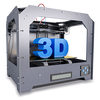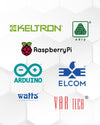
RASPBERRY PI 4 SPECIFICATION AND FEATURES
Introduction
Raspberry Pi 4 has a full-chip redesign, the first in the history of Raspberry Pi, and it's unlocked new levels of performance. Our specs & features show just how much faster Raspberry Pi 4 is

Raspberry Pi 4 improves on its predecessor, with improved specifications across the board. Our Raspberry Pi 4 benchmark tests show a huge increase in performance over previous models.
It’s not hard to see where this benchmark boost comes from. The brand-new BCM2711B0 system-on-chip has more powerful processing cores, the first upgrade to the graphics processor in the history of the project, and vastly improved bandwidth for both memory and external hardware.
Gone is the single-lane USB bottleneck which hampered performance on older models, and Raspberry Pi 4 shines in benchmarks as a result.
Raspberry Pi 4 specs
- SoC: Broadcom BCM2711B0 quad-core A72 (ARMv8-A) 64-bit @ 1.5GHz
- GPU: Broadcom VideoCore VI
- Networking: 2.4 GHz and 5 GHz 802.11b/g/n/ac wireless LAN
- RAM: 1GB, 2GB, or 4GB LPDDR4 SDRAM
- Bluetooth: Bluetooth 5.0, Bluetooth Low Energy (BLE)
- GPIO: 40-pin GPIO header, populated
- Storage: microSD
- Ports: 2 × micro-HDMI 2.0, 3.5 mm analogue audio-video jack, 2 × USB 2.0, 2 × USB 3.0, Gigabit Ethernet, Camera Serial Interface (CSI), Display Serial Interface (DSI)
- Dimensions: 88 mm × 58 mm × 19.5 mm, 46 g
Brand new SoC: BCM2711B0, quad-core 1.5GHz
The new BCM2711B0 system-on-chip offers an impressive performance boost over its predecessors.

Dual display via micro HDMI
The two micro-HDMI connectors enable Raspberry Pi 4 to drive two 4K displays at up to 4Kp30, or a single display at up to 4Kp60

Gigabit Ethernet and USB 3.0
The Ethernet port, relocated to the top-right of the board, now offers full-speed network connectivity with no bottlenecks. Two USB 3.0 ports, centre, offer high-speed connectivity for external devices including storage and accelerator hardware.

Raspberry Pi 4 Benchmarks
Linpack (CPU speed test)
A synthetic benchmark originally developed for supercomputers, Linpack offers a glimpse at just how far the Raspberry Pi family has come. This version – ported by Roy Longbottom – comes in three variants: the fast single-precision (SP), slower double-precision (DP), and a single-precision variant accelerated using the NEON instructions available in Raspberry Pi 2 and above (NEON).

Speedometer 2.0 (browser speed test)
Speedometer 2.0 measures the responsiveness of the Chromium web browser by running a web application – a to-do list – and measuring how many times the application can be completed each minute. Here, performance hinges not only on CPU performance but on memory speed and capacity – the test proved too much for Raspberry Pi A+.

OpenArena Time Demo (GPU speed test)
The new VideoCore VI gives Raspberry Pi 4 a significant boost over its predecessors, as demonstrated in this gaming workload test: the Quake III-based OpenArena first-person shooter runs through its built-in demo as quickly as possible at a High Definition (1280×720) resolution, while the average frame rate in frames per second (fps) is recorded.

Memory bandwidth
Although many workloads are primarily limited by CPU speed, others rely on memory bandwidth – the rate at which data can be written to and read from RAM. In this benchmark, the RAMspeed/SMP tool is used to measure the read and write bandwidth for 1MB blocks in megabytes per second (MBps).

Python GPIO Zero
Sitting somewhere between a synthetic and a real-world benchmark, here the Python GPIO Zero library is used to toggle a GPIO pin on and off as quickly as possible while a frequency counter measures the switching rate in kilohertz (kHz). This test is boosted by CPU speed.

Power draw
More performance typically means more power, and here each Raspberry Pi model is left running a CPU-intensive benchmark while an HDMI display and a USB keyboard and mouse are connected. The peak power draw in watts is measured from the wall, and then an ‘idle’ draw with a Raspberry Pi sat at the Raspbian desktop is measured for comparison.

Buy Raspberry Pi4 From www.tomsonelectronics.com



